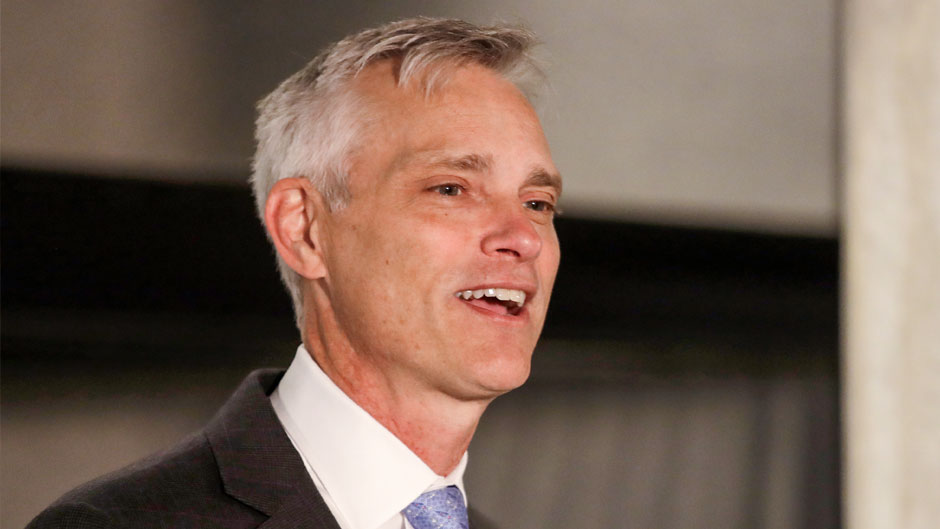In a virtual conversation about leadership, Robert Isom, president of American Airlines, emphasized the industry’s resiliency and purpose while detailing the changes being made to improve safety and customer satisfaction.
In a nod to the maxim “building it on the fly,” Isom said in the Nov. 12 webinar that as the coronavirus plunged the world economy and airline industry into freefall, the company reassessed operations on a near daily basis and aggressively sought financial support to offset the loss of $85 million a day in the spring.
Isom, head of both the parent company and the airline since August 2016, took part in a discussion with Dean John Quelch as part of the Virtual Distinguished Leaders Lecture Series hosted by the University of Miami Patti and Allan Herbert Business School.
“As an airline we have plans for just about everything—including pandemics—but we’d never seen or imagined anything like this,” Isom said. “We took aggressive action looking at our people and our planes—we had to pull down operations from 100 percent to 20 percent—and much of our attention right away went to raising cash, conserving cash, and really trying to find a way to get people back to travel,” he explained.
“We made some really quick moves that were designed to staunch the tide of bleeding and to position us to come out on the other end,” he added. The assessment focused on efficiency and simplifying business operations. To that end, the airline retired 150 planes from its force of 1,500, trimmed its fleets and sub-fleets from 50 to 25, cancelled routes and destinations, and used four specific aircraft exclusively.
The $50-billion-support package provided by Congress in March to the airlines was a critical lifeline to the industry.
“What appealed to both sides of the aisle in our talks with the government is that the airline business is essential to commerce and that without support the consequences would have been catastrophic,” said Isom, adding that the combination of government loans and payroll support grants helped American Airlines maintain its workforce through October.
Recently, though, the company announced that some 20,000 workers are being furloughed.
Isom also highlighted the many new safety features and measures the airlines have incorporated and pointed to statistics that counter the “myth” that flying is unsafe during the pandemic.
“In terms of the aircraft, we have the youngest fleet with the most modern air filtration systems,” he explained. “The air on an aircraft is filtered and brought in new such that the air is changed every few minutes, almost 20 times an hour—it’s the equivalent and even better than what you would get in the best hospital operating room.”
Of the more than 1 billion people who have flown since the pandemic outbreak there are less than 50 cases of contact tracing that the industry has been asked to pursue by the Centers for Disease Control, according to Isom. He also noted that the airlines overall have a lower infection rate than that of the country, and that American Airlines flight attendants and agents have a lower rate than other sectors of the company.
“We know in whole that the aircraft itself is a safe environment—if we can just get people wearing masks and taking the appropriate precautions elsewhere, we can get this thing under control,” he said.
Isom highlighted Miami’s importance to the airlines, which employs some 11,000 workers locally. “Ever since American secured the Latin American network 30 or 40 years ago, it’s been a gem, both as a dynamic local and originating marketplace, and as a connecting gateway to the Caribbean and the region—it’s central to American’s future,” Isom said.
In terms of customers, Isom pointed out, more than 50 percent of the company’s travelers now are younger than 30, and that leisure traffic dominates. Business travel has dropped to 15 percent of pre-COVID-19 figures.
Despite the many challenges, one silver lining has been the additional time that authorities have been able to spend investigating the safety of the Boeing 737 MAX aircraft, which was grounded in March 2019 after two tragic accidents within five months. American Airlines had purchased 24 of the aircraft.
“Boeing, the Federal Aviation Administration, the pilots union have spent well over a year and a half scrutinizing the aircraft at every level to the Nth degree,” he said, adding that he anticipates the decision to unground the plane in the coming weeks and for “a handful” of flights from Miami International to LaGuardia Airport to resume by the end of December.
Isom said he would be among those flying on the first test flights.
In response to a student’s question about the three traits most necessary to work in the airlines industry, Isom put trust at the top of the list.
“Trust is so important, doing and delivering what’s expected when it’s expected. And our team members through this crisis have really come together to demonstrate that,” he said. “They realize more than anybody what’s at stake right now and realize what they do for the country.”
What permanent changes to the industry does he expect as a result of the pandemic?
“The confidence in safety is part of how we’re going to live going forward,” he said. “That will make for a better travel experience all around and much higher customer satisfaction,” Isom said.
“People are going to demand much more control of their environment,” he said. “No change fees are things that are likely here to stay—people want that flexibility, they want that cleanliness, and they want to control their itinerary.”
